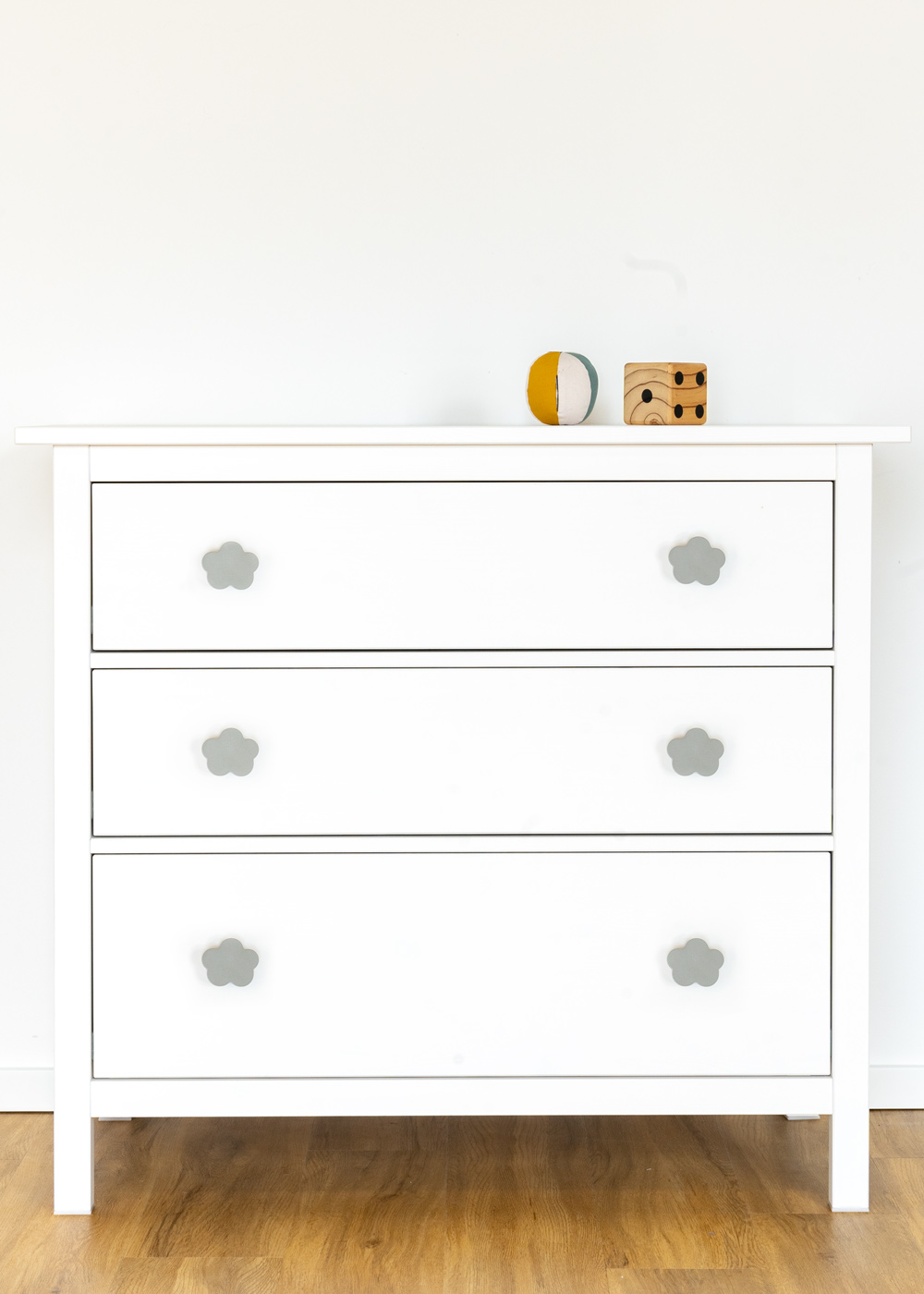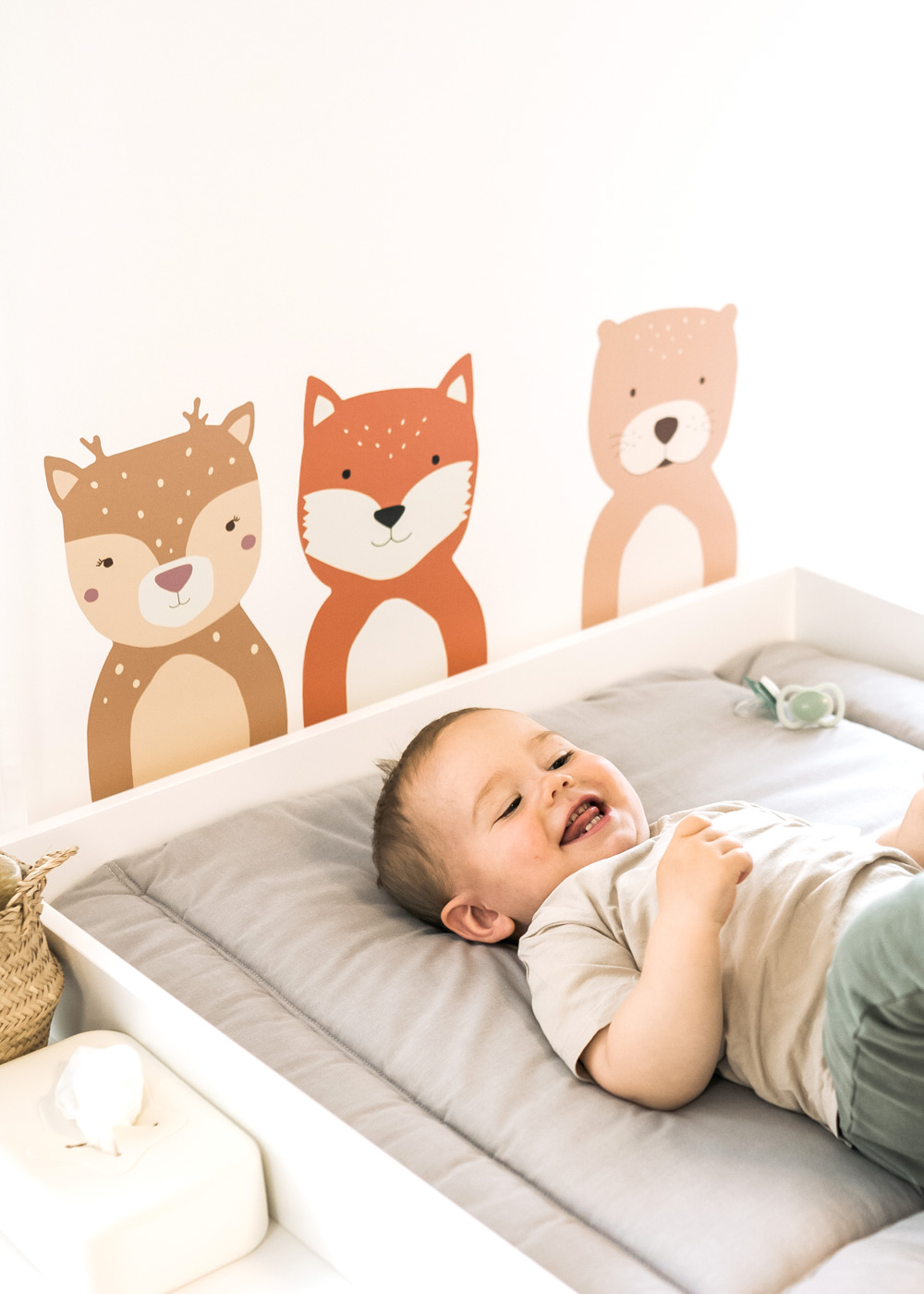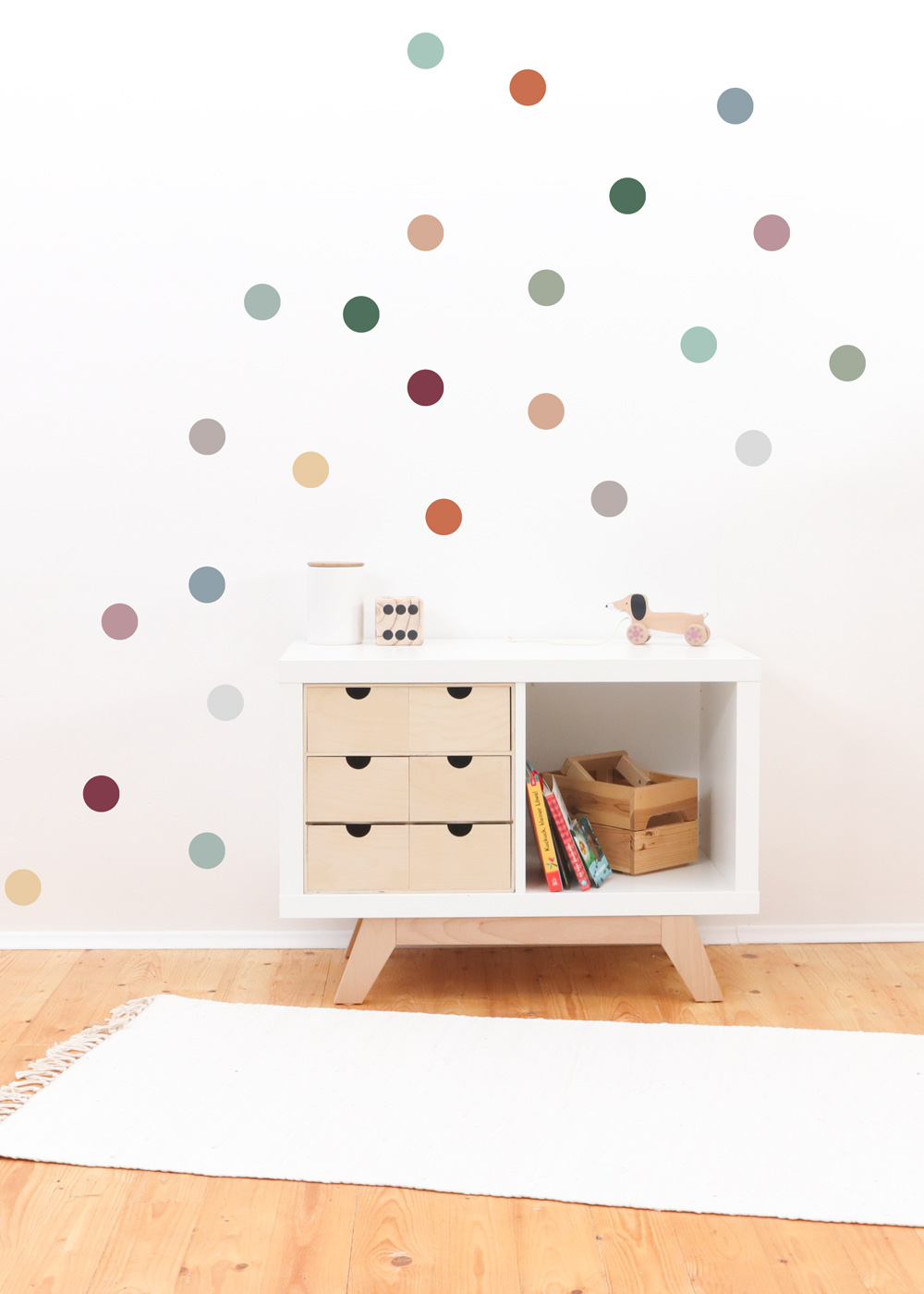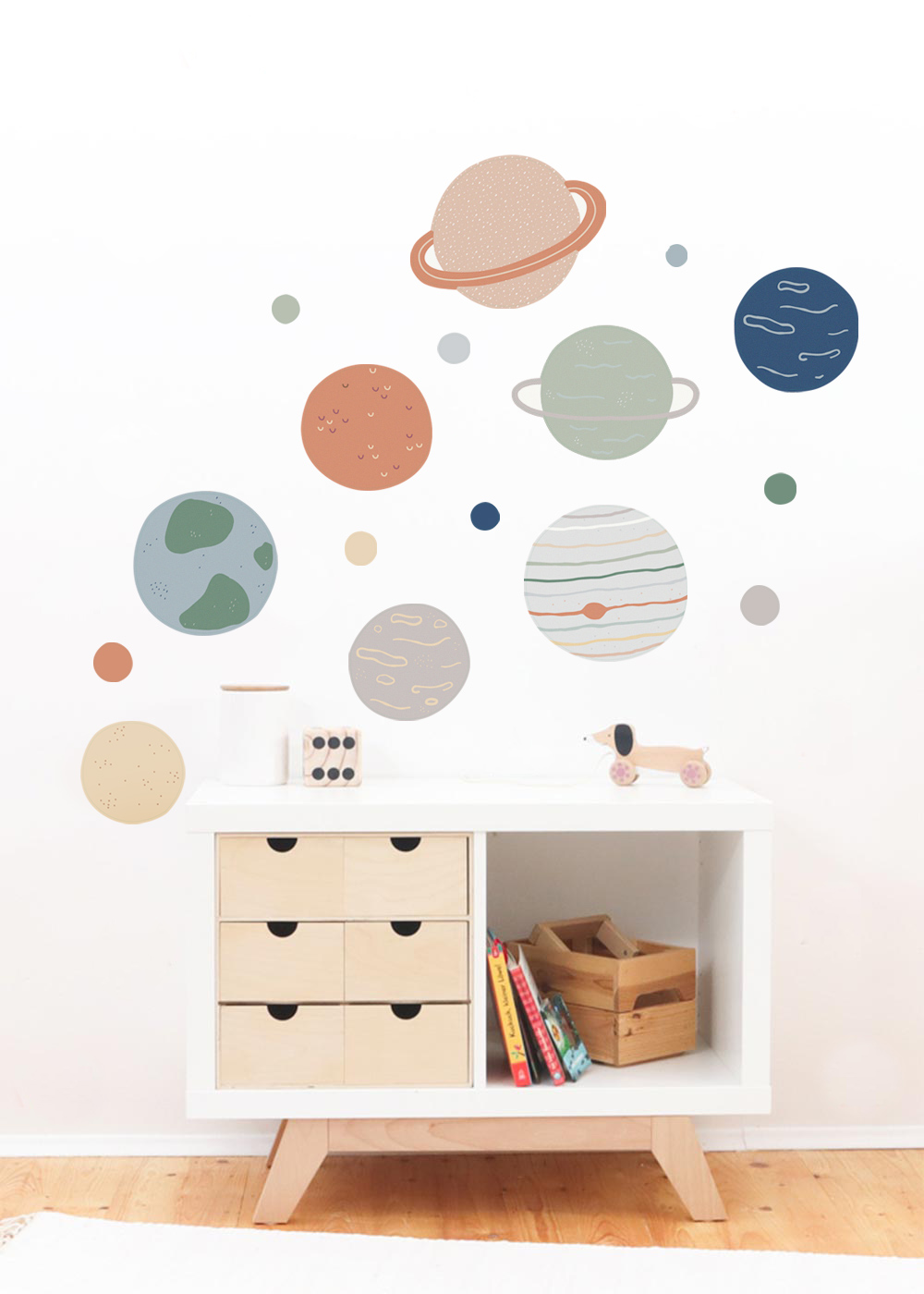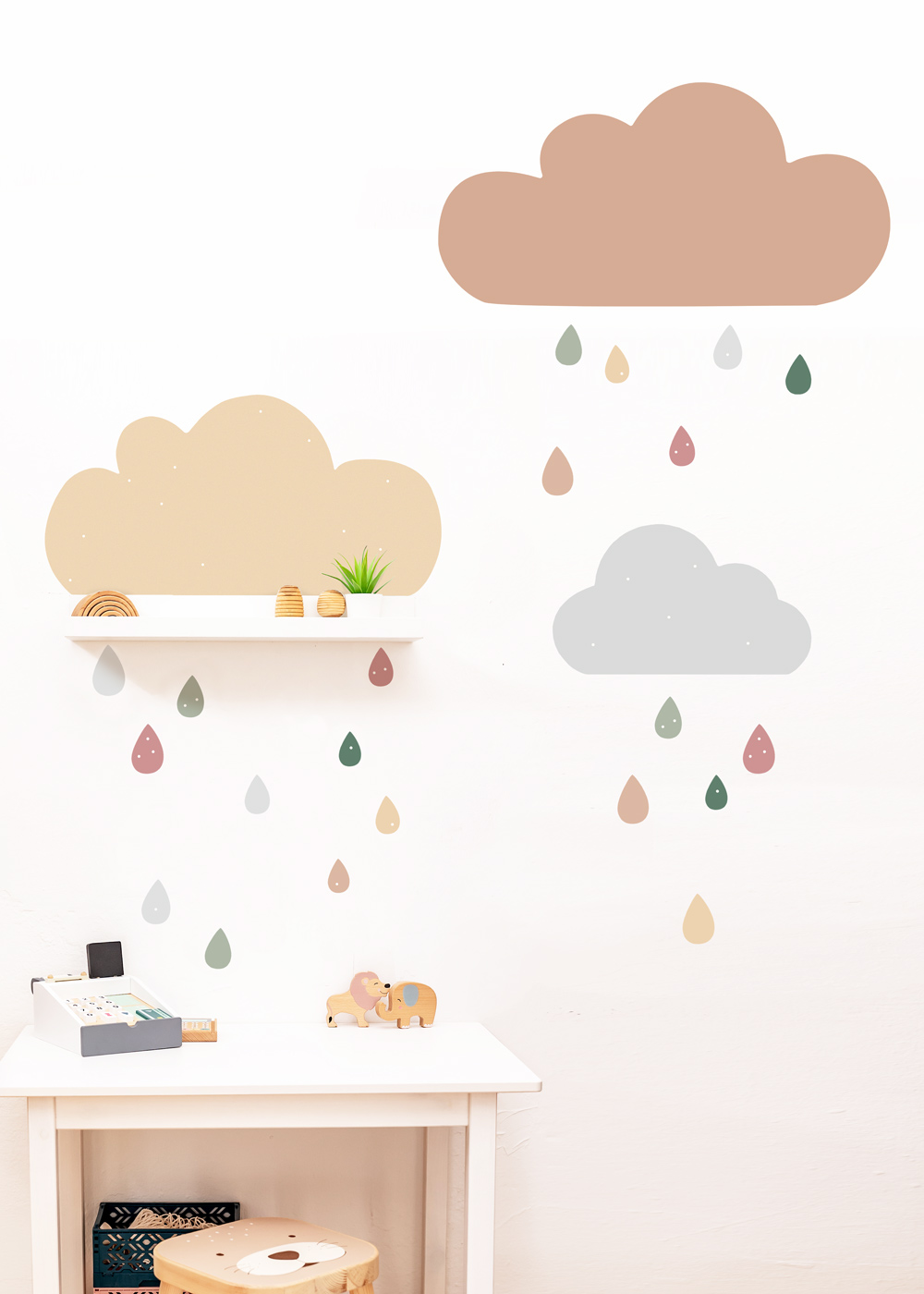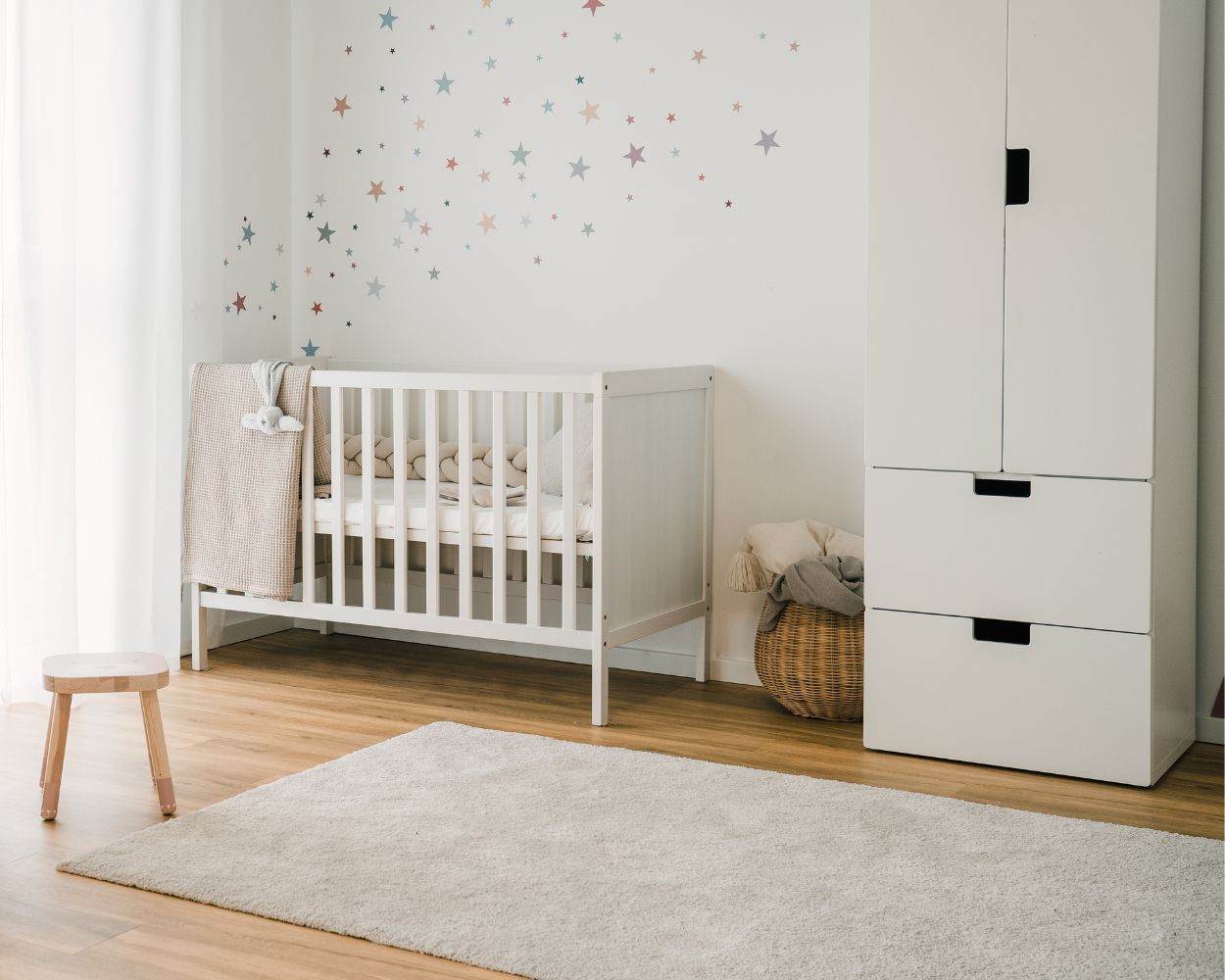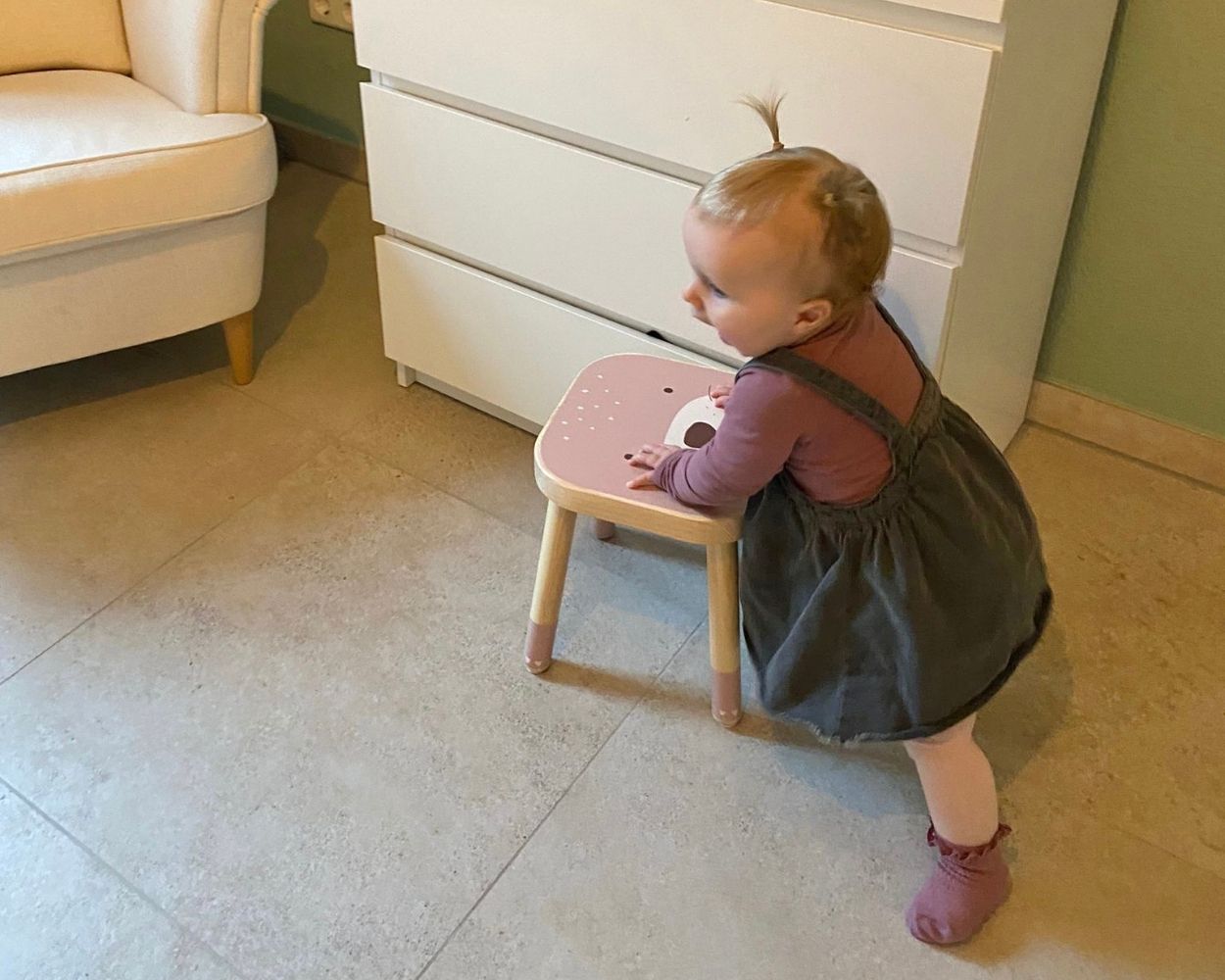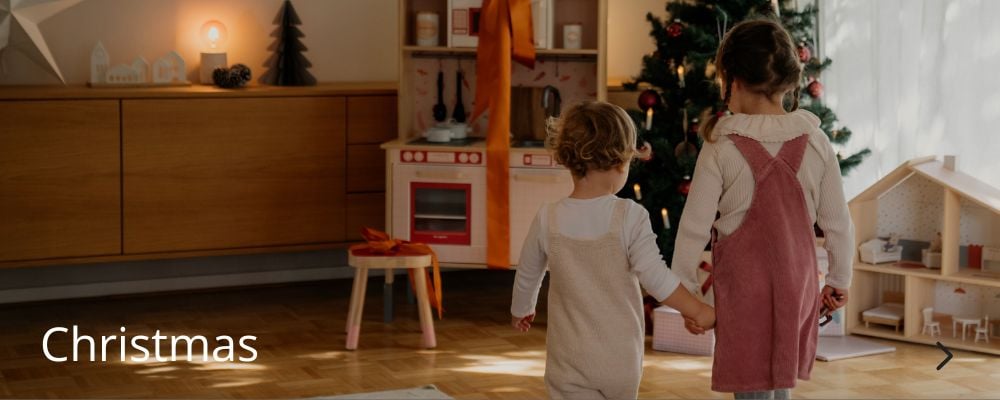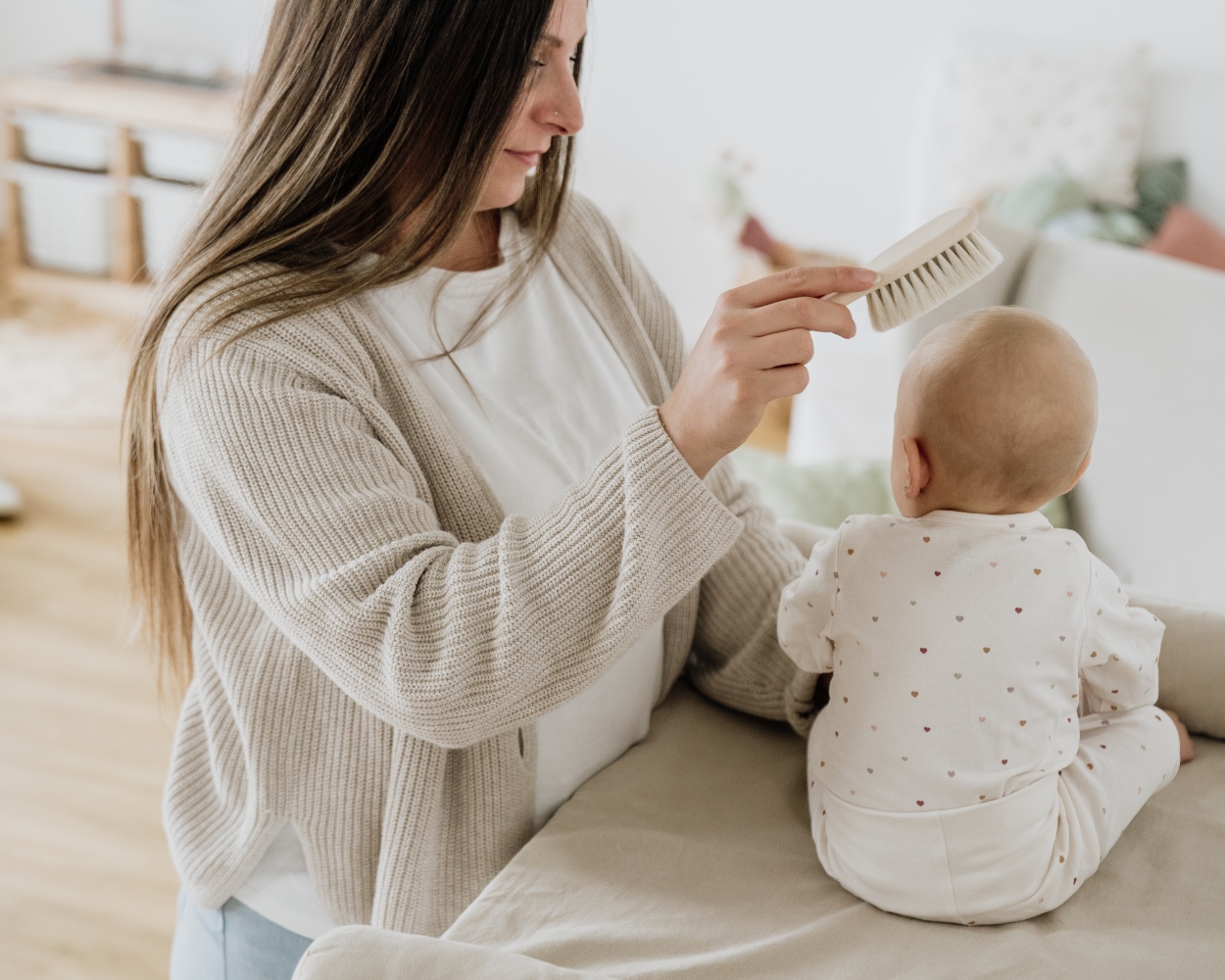
Why a cosy baby room is important
A cosy baby room has an important function: it creates a comfortable atmosphere for your little one and helps them to feel safe and secure. Just think about how uncomfortable you feel in an uncomfortable bed or in a room with bright light. Of course, your baby won't have the same preferences as you, but it's important that they feel comfortable in their room.
A cosy baby room can help your little one to sleep better and calm down more quickly. Choosing the right furniture and accessories also plays an important role in creating a cosy baby room. There should be enough space to play and explore, but also places to retreat to for rest breaks.
Colours and patterns can also have a big impact on the mood in the room. So take your time when planning your baby's room and make sure that it is a place where your little one can feel completely at ease.
Baby room checklist: What you need
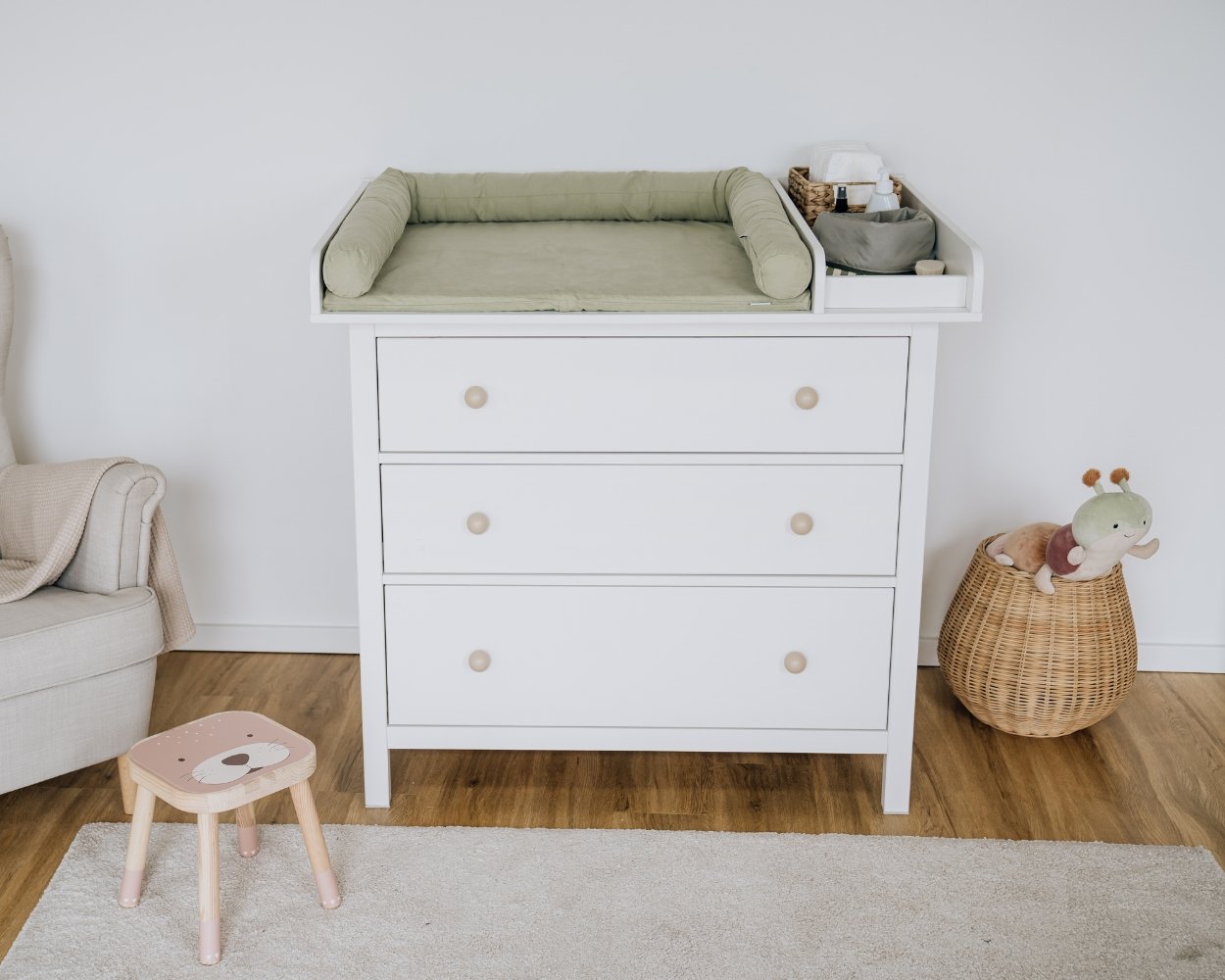
1. Changing unit with plenty of storage space
The ideal location for your changing unit
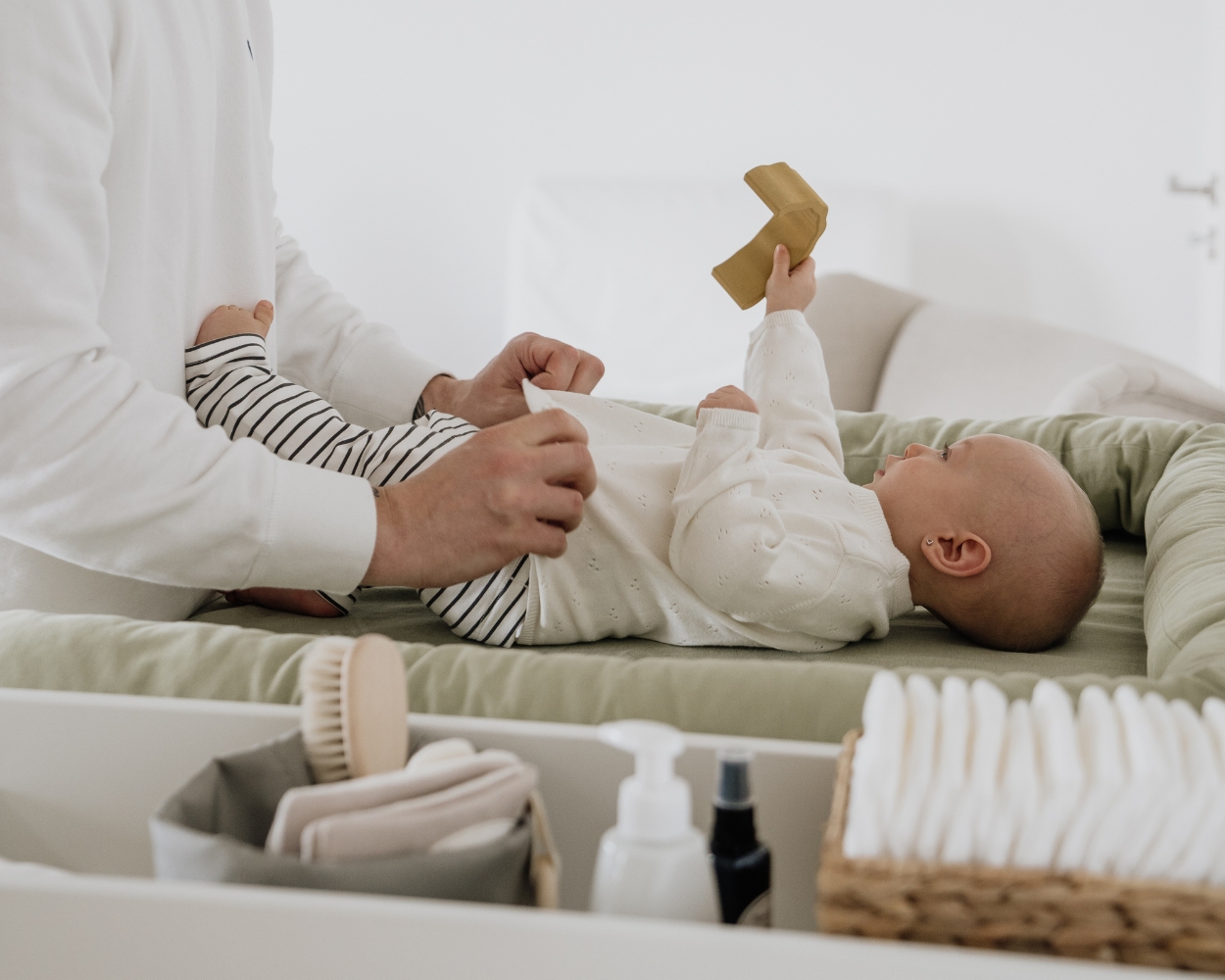
Checklist for your changing unit
- Safety on the changing unit: Make sure that your chest of drawers is sturdily constructed and stands securely. If you want to attach a wall shelf, this must be fixed professionally. Your baby should not get any creams or oils in their hands.
- Sustainable purchase decision: Do you already have a suitable chest of drawers at home? You can convert many IKEA chests of drawers or vintage pieces of furniture into a changing unit using changing table topper. This means you don't need to buy a new piece of furniture and can continue to use the chest of drawers after the nappy-changing phase.
- Everything you need for nappy changing: A changing unit with sufficient storage space for nappies, clothes and care products makes your daily routine easier. Use baskets or boxes in different sizes for nappies, care products or clothes. Dividers in the drawer are particularly practical for small items of clothing. Cosmetic products can be stored on a wall shelf out of your baby's reach - but under no circumstances should they fall off.
- Distraction on the changing unitso that your little one enjoys nappy changing, you should have distraction items to hand. Toys, cuddly toys or even a hairbrush will keep your little one occupied while you change nappies undisturbed. However, it's better not to let your baby get their hands on cosmetic products.
- Cheerful decoration: You can transform the changing unit in the baby's room with handles and cute stickers to make it child-friendly.
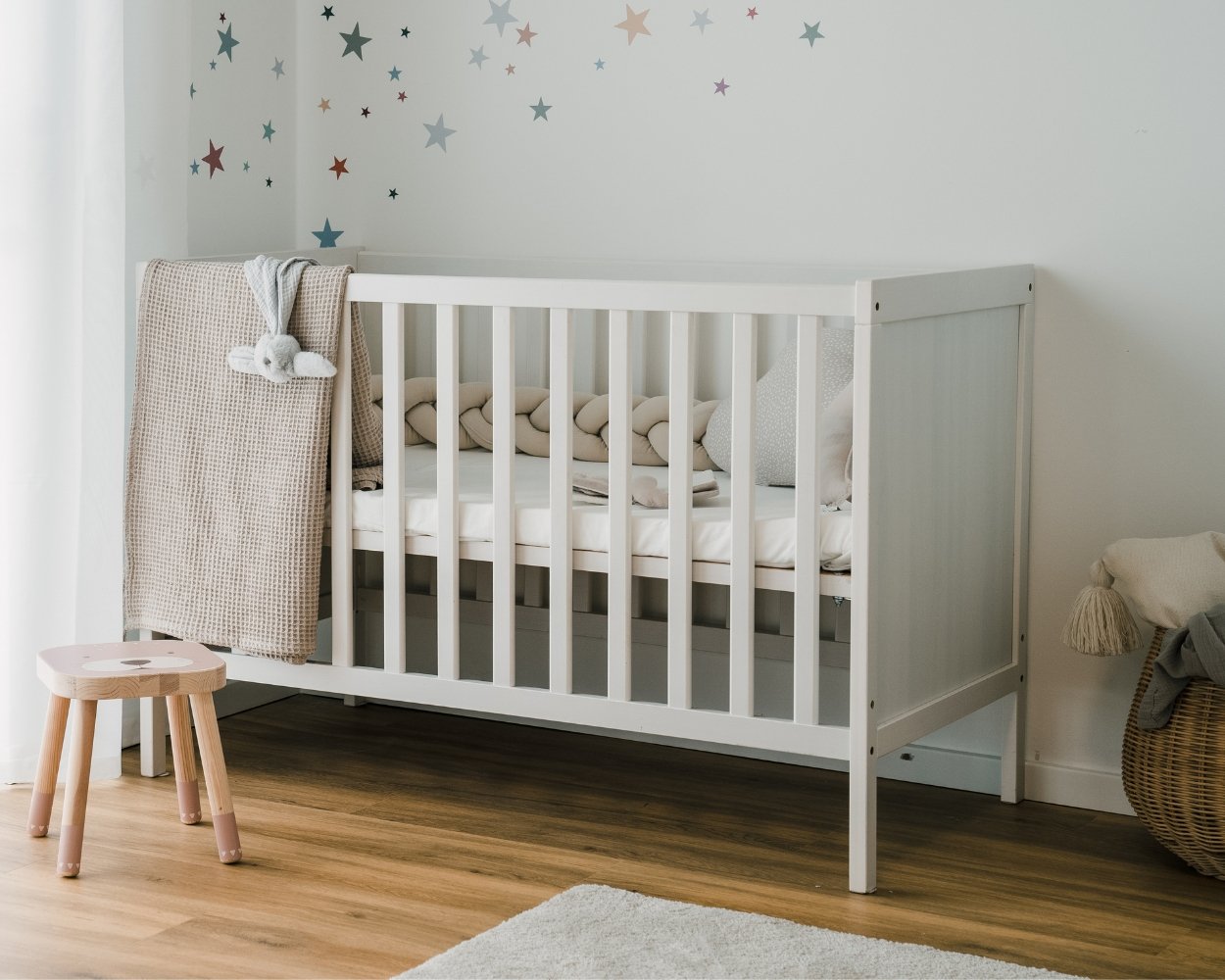
Baby cot checklist
- Baby cot, extra bed or family bed? The decision for or against a cot is very individual and depends on your personal circumstances and the needs of your baby. Thinking about a shared bed? You can find all the information and IKEA hacks about family beds via the link.
- Safety in the cot: Make sure that the cot is stable and meets current safety standards. A suitable mattress should also be included. Make sure that the cot is not overfilled with pillows, blankets and cuddly toys. Too many textiles could pose a choking hazard for your baby.
- Location of the cot: The choice of whether the cot will be in the parents' bedroom or in the baby's room is also individual. How can you all sleep best? Trial and error is often the order of the day.
- Buying sustainable furniture: Many cots can be flexibly converted. As soon as your baby grows up, you can lower the base of many models and remove one side of the bed rail. A bed that grows with your child can be used for much longer.
- Cosiness with stylish decorations: A bed snake around the edge makes the cot extra cosy. And matching wall stickers around the bed make the sleeping area an eye-catcher in the baby's room.
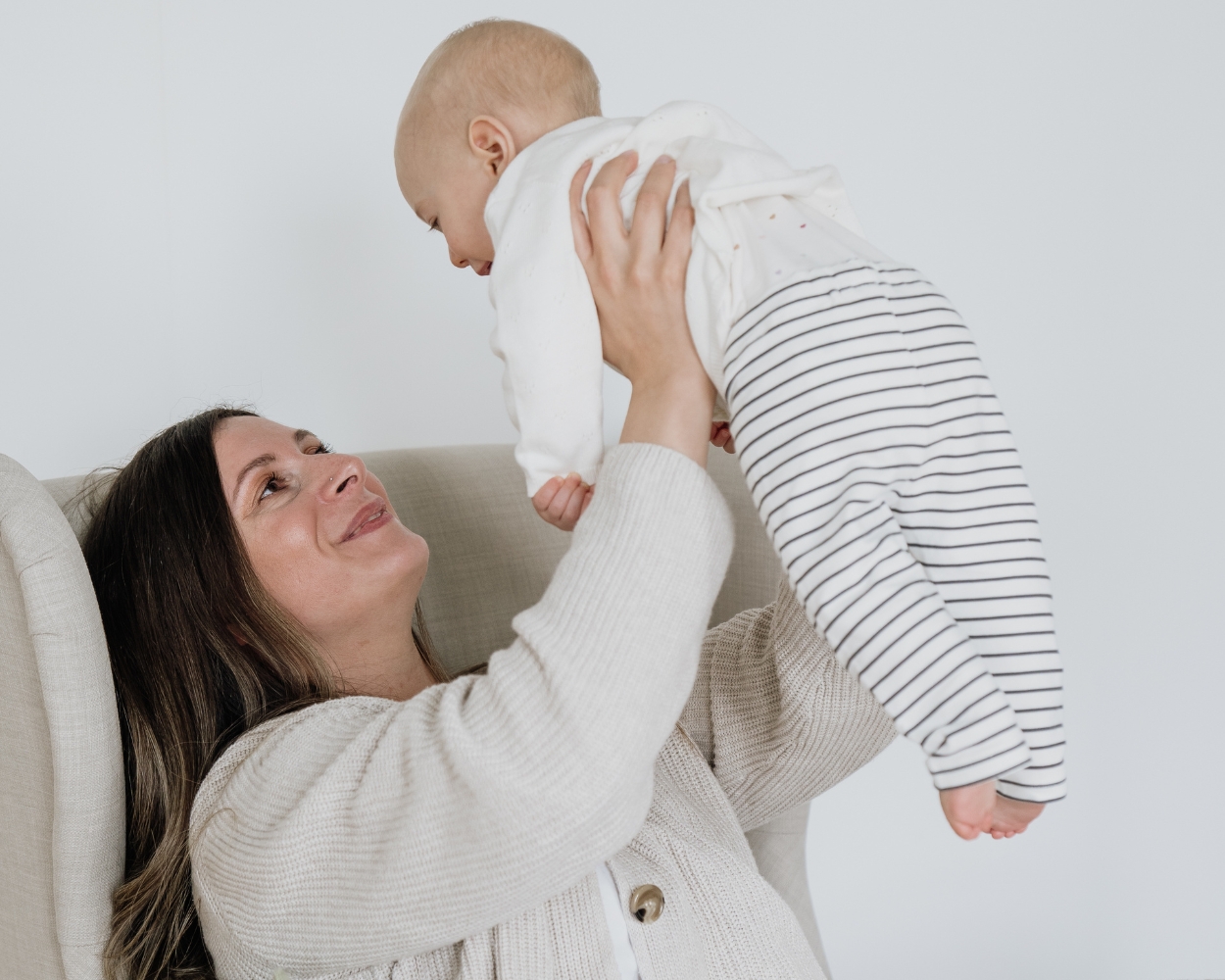
3. Breastfeeding and cuddling in the baby room
A comfortable armchair or a cosy sofa are ideal for cuddling with your baby or for breastfeeding. You can also sit down comfortably when you are putting your baby to sleep.
Of course, you don't always have to breastfeed and cuddle in the baby's room. But a fixed place where you can retreat to in peace and quiet encourages rituals and can have a calming effect on your baby.
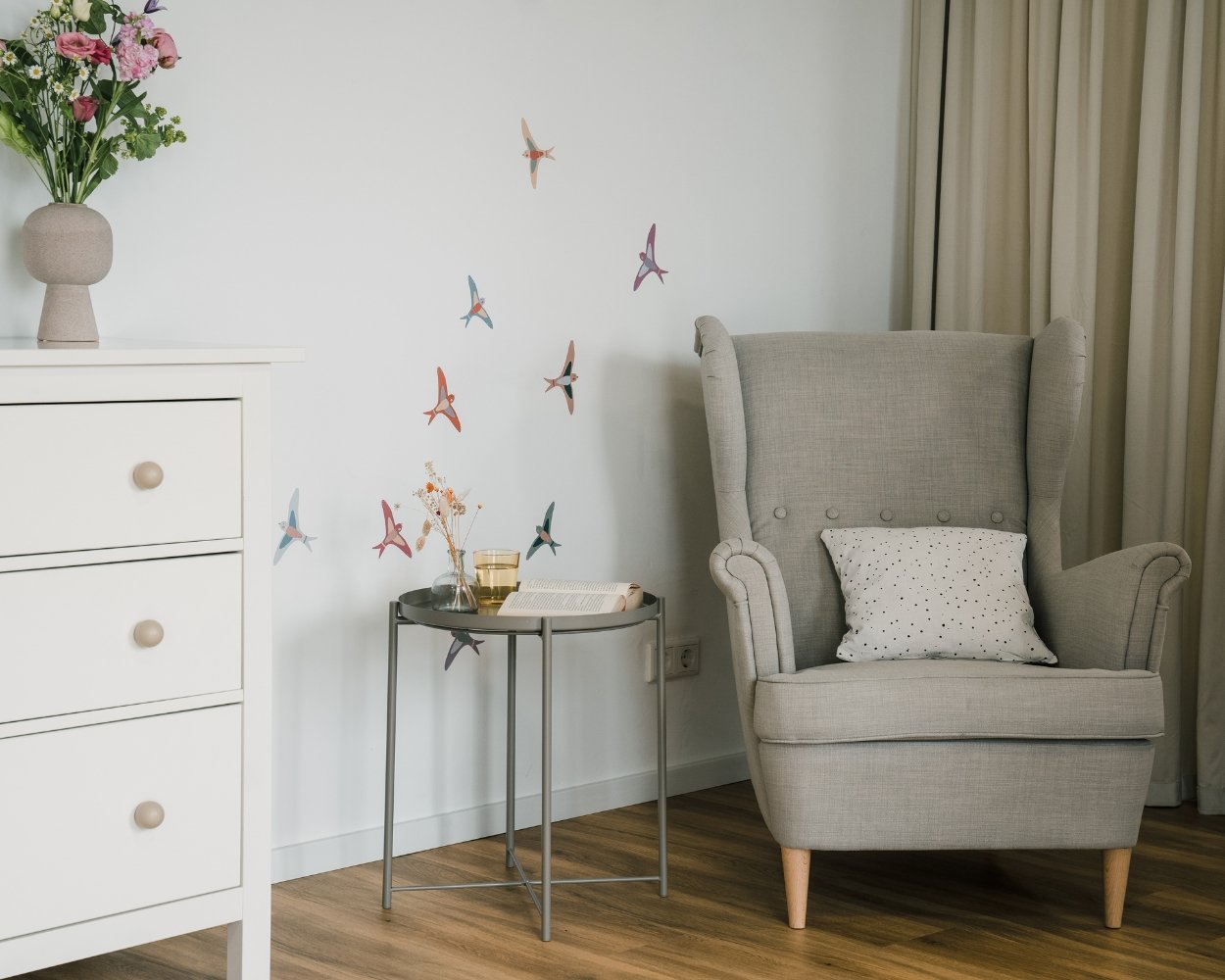
Checklist for the cosy corner
- Cosiness has priority: cuddling and breastfeeding (or bottle feeding) will soon be part of your daily routine. Your breastfeeding area should therefore be comfortable and inviting. You should be happy to sit there.
- Sufficient space: Make sure that you and your baby have enough space in the breastfeeding chair. Even when your baby gets a little bigger. A side table also gives you the opportunity to put something down.
- Quiet corner: Place your breastfeeding area in a quiet corner. With few distractions, your baby can relax best. And you too, of course.
- Durable fabric: When breastfeeding, something will spill from time to time. It is therefore advisable to choose an armchair that is easy to clean. Insensitive textiles can be easily cleaned with upholstery cleaner.
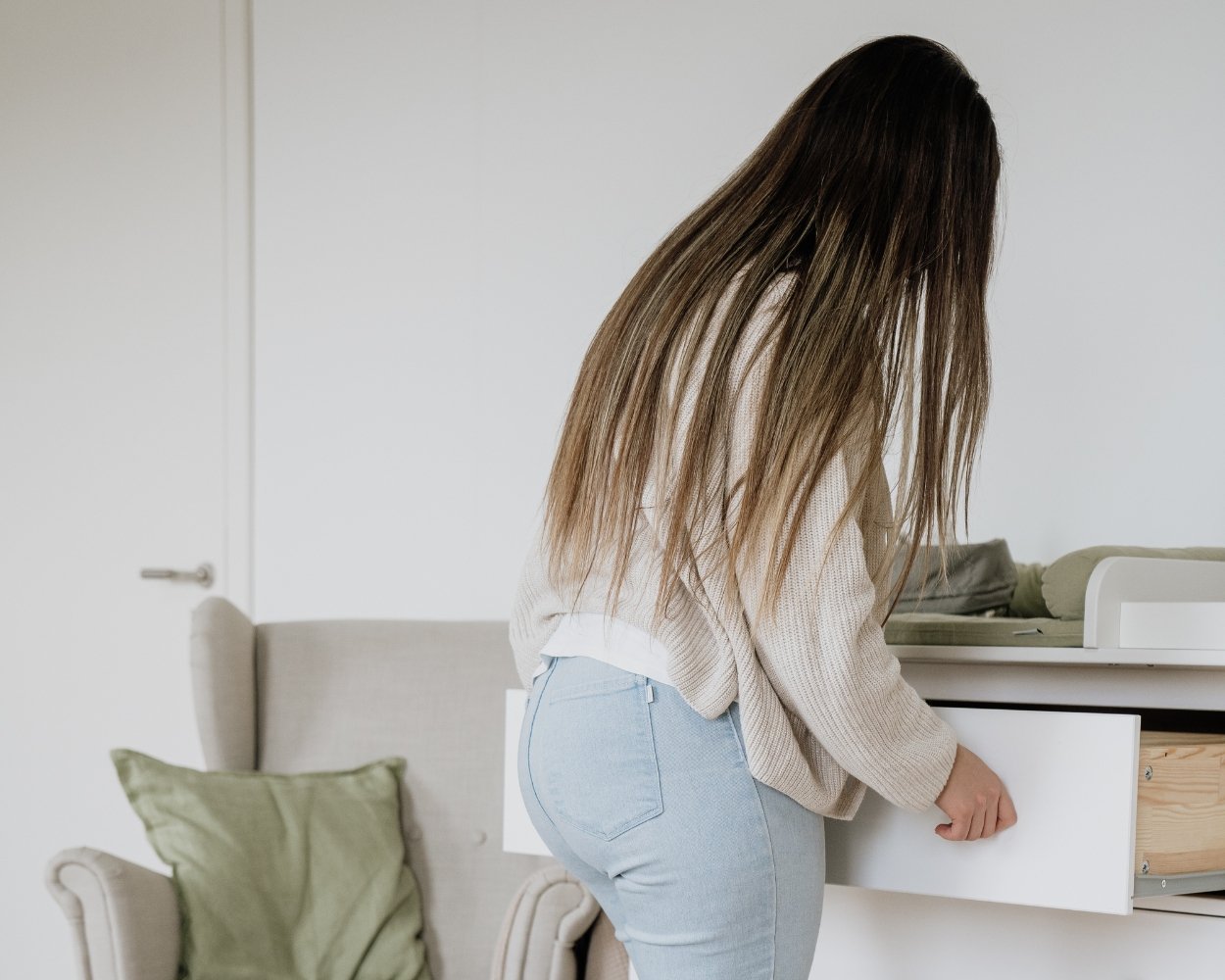
4. Storage & organisation in the baby room
Practical storage in the baby room is essential for keeping organisation and having everything you need quickly to hand. Especially on the changing unit, but ideally everything should also have its place in the rest of the room. Remember: the simpler the storage options are, the more likely you are to use them regularly. So keep the room as minimalist as possible - less is often more!
Checklist for organisation in the baby room
- Store small items well: Use baskets or boxes in different sizes for toys, nappies and clothes.
- Organisation in the drawer: Use drawer inserts with dividers. Your baby's clothes are so small that it's easy to lose track of them in a large drawer.
- Closed storage space: In the beginning, your little one won't be able to do anything on their own, but this will change quickly. And all items that are kept open and within your baby's reach will become interesting. You should therefore also have closed storage space where possible, for example in the form of a wardrobe. Bear in mind that this should also be attached to the wall for safety reasons.
- Decorative storage space on the wall: Shelves on the wall save space on the floor and can be used to showcase beautiful things. Tip: Use wall foils to create cute shelves in the baby room.
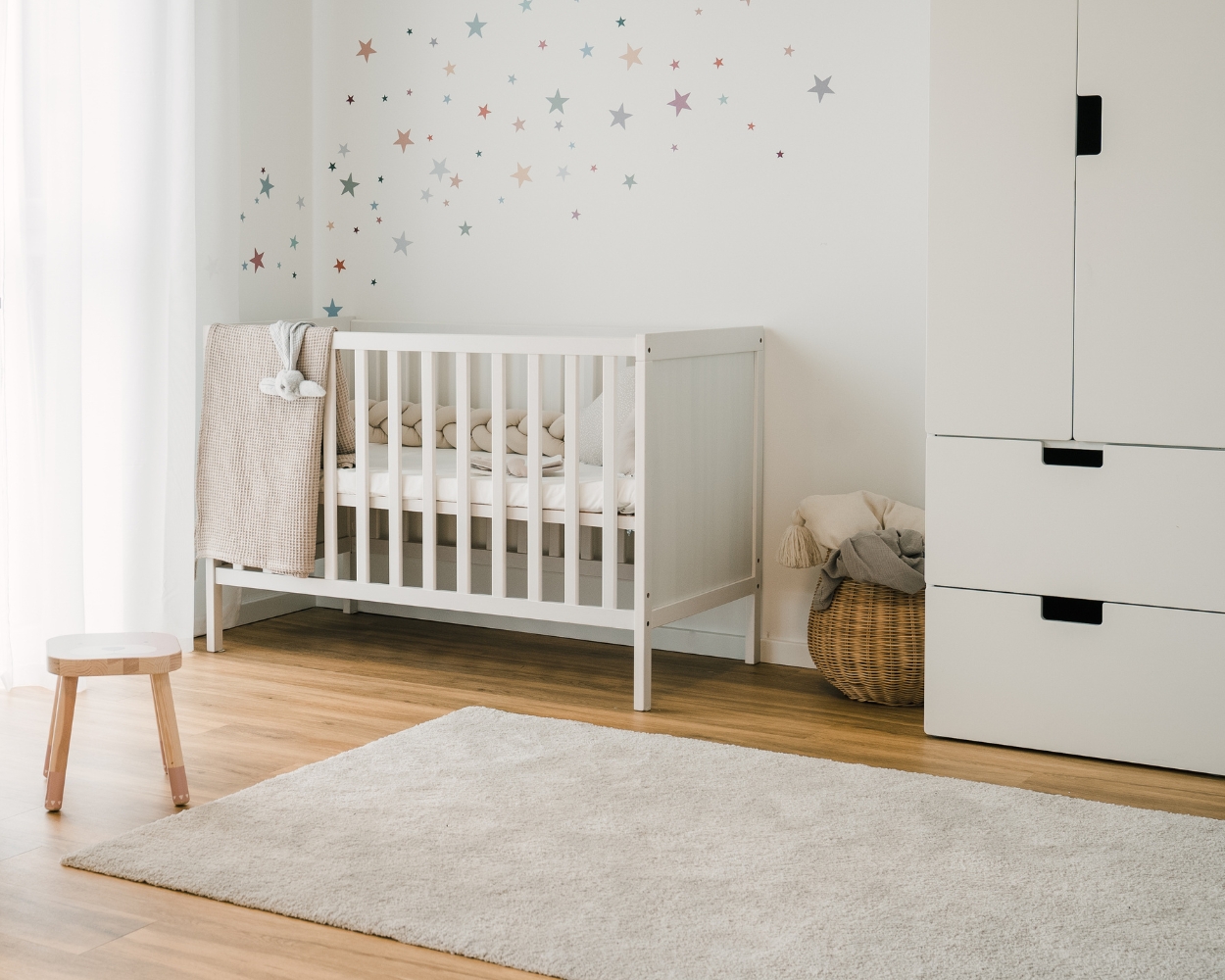
5. Carpet in the baby room
Carpets create a warm atmosphere in the room and ensure that your baby can also play barefoot on the floor. It is best to choose models without harmful substances made from natural materials such as cotton or wool. A high-quality natural rug creates a cosy atmosphere in the baby's room, promotes your child's health and stimulates their creativity. So don't hesitate to invest a little more money in a high-quality model - it's worth it!
Checklist for your carpet in the baby room
- Natural materials: These are not only more environmentally friendly, but also healthier for your child. This is because synthetic carpets can contain harmful substances and cause allergic reactions.
- Easy to clean: Make sure that the carpet is made of hard-wearing materials that are easy to clean.
- Safety: When buying, make sure that the carpet is non-slip and does not pose a tripping hazard. Alternatively, you can place an anti-slip mat under the carpet. This is particularly important later in the children's room, where the little ones often run around wildly.
- Child-friendly motifs: Choose a rug with a child-friendly motif or pattern. This will turn your child's room into a place full of imagination and adventure. A plain rug can also be particularly beautiful in a baby's room.
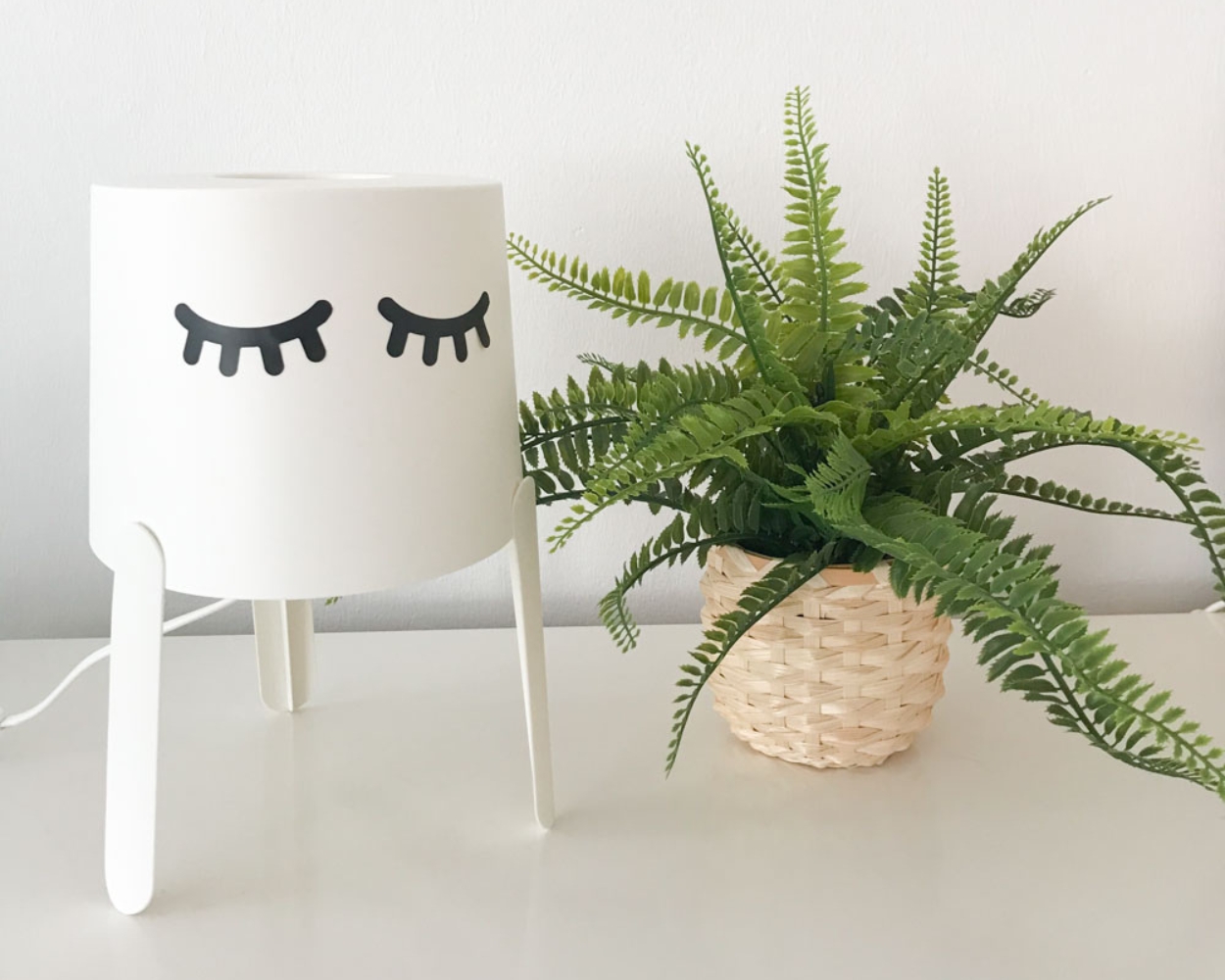
6. Lighting in the baby room
The right light in your baby's room is important for your child's well-being. It should not be too bright, but not too dark either. A dimmable lamp or indirect lighting are ideal for this. All in all, the right light makes a significant contribution to your baby's well-being. With well thought-out lighting, you can create a cosy atmosphere in the room and support your child's healthy sleep and circadian rhythm.
Checklist for light in the baby room
- Avoid dangers: Make sure that the lamps are secure and stable and cannot pose a hazard.
- Indirect light: You should also make sure that the light does not shine directly into your baby's eyes. A good option is to install the light on the ceiling and provide it with a lampshade or cover. Night lights can also create a cosy atmosphere and help to soothe your baby to sleep.
- Cosy colour temperature: However, make sure that the light in the baby's room is not only functional but also cosy. A warm yellow or orange light creates a pleasant atmosphere for relaxing and falling asleep. If you opt for LED lamps, you should look for a warm white colour temperature. This has a particularly cosy effect and creates a comfortable ambience in your child's room.
- Save energy: Another important aspect when choosing the right light for your baby's room is energy efficiency. Make sure you choose energy-efficient light sources - this will not only save you money but also do something good for the environment.
- Strengthen the rhythm with light: There are also special lamps for the baby's room that have different colours and brightnesses and can therefore support the natural day-night rhythm. These so-called "light alarm clocks" simulate a sunrise or sunset and help your baby to get used to a regular sleep rhythm.
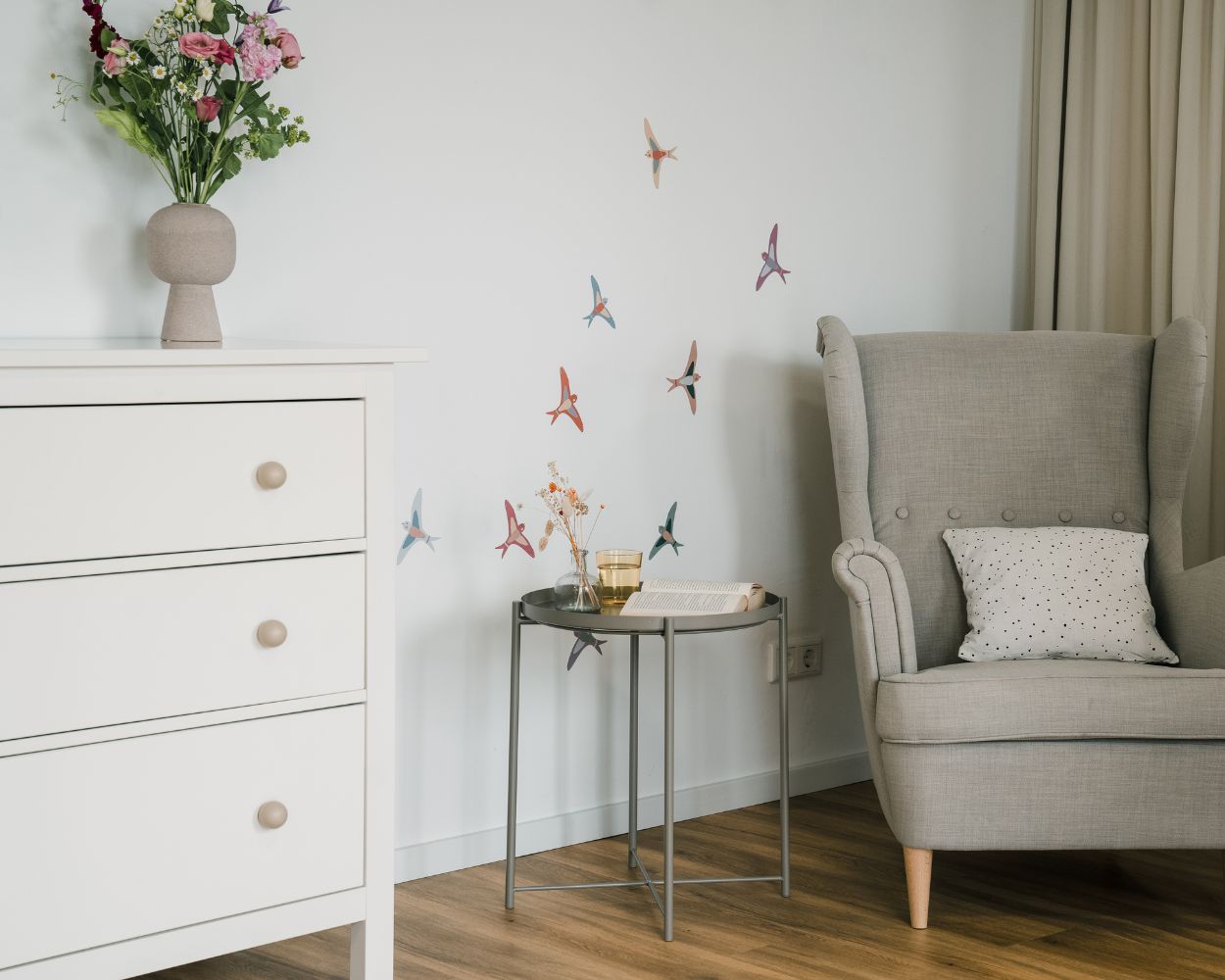
7. Decoration & colours in the baby room
In addition to functional aspects, the design of the nursery should not be neglected. With a harmonious choice of colours and cute details, you can create a cosy retreat for your baby. And decorating is of course the most fun.
Checklist for decorations and colours in the baby room
- Colour selection: Choose a calming colour palette for your baby's room, such as pastel shades or soft natural tones. Avoid bright and over-stimulating colours, as they could potentially irritate your baby. Remember that certain colours can have a calming effect, while others can be more energetic. Take this into account when making your choice.
- Wall design: Opt for a neutral colour or a subtle pattern as a background. Ideally, use washable paint or wallpaper that is easy to clean in case your baby smears something on the wall. You can also include wall tattoos in the decorations to spice up your room.
- Window decorations: Choose translucent curtains or blinds to let in natural light and create a cosy atmosphere. Avoid long curtains with hanging strings or ribbons, as these could be a potential danger to your baby.
- Mobiles: Hang a mobile above your baby's bed to provide visual stimulation. However, this should hang out of your baby's reach.
- Safety: Make sure that all decorative elements are secure and well fastened to prevent them from falling or tipping over. Remove small objects or decorations that could pose a choking hazard for your baby. Check the safety of decorative elements regularly.
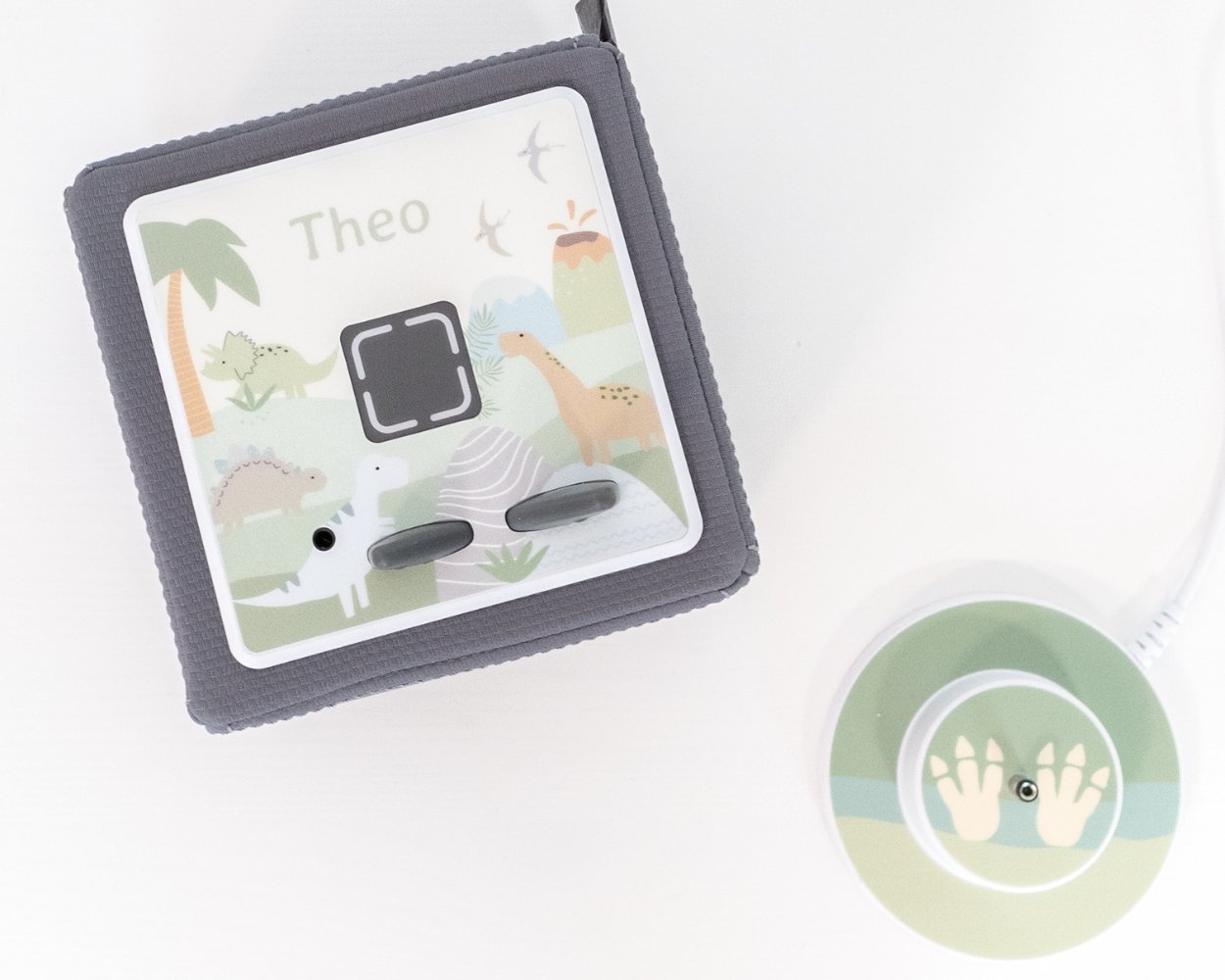
8. Music and sounds in the baby room
Music and sounds can have a calming effect on your baby. A gentle melody or the sound of a waterfall can help your child relax more quickly and fall asleep better.
Checklist for music and sounds in the baby room
- Choose the right music: There is special sleep music for babies that contains various natural sounds such as birdsong or the sound of the sea. Just give it a try!
- The dose makes the poison: Make sure that the music is not too loud and that it is not played continuously. Too much noise can damage your baby's hearing and cause unnecessary stress.
- Device safety: The source of the music should also be placed safely - preferably out of your baby's reach. A Toniebox is also a good idea. The sound system is specially designed for children and will accompany you through your entire childhood with the funny characters. You can personalise your Toniebox with the matching protective film.
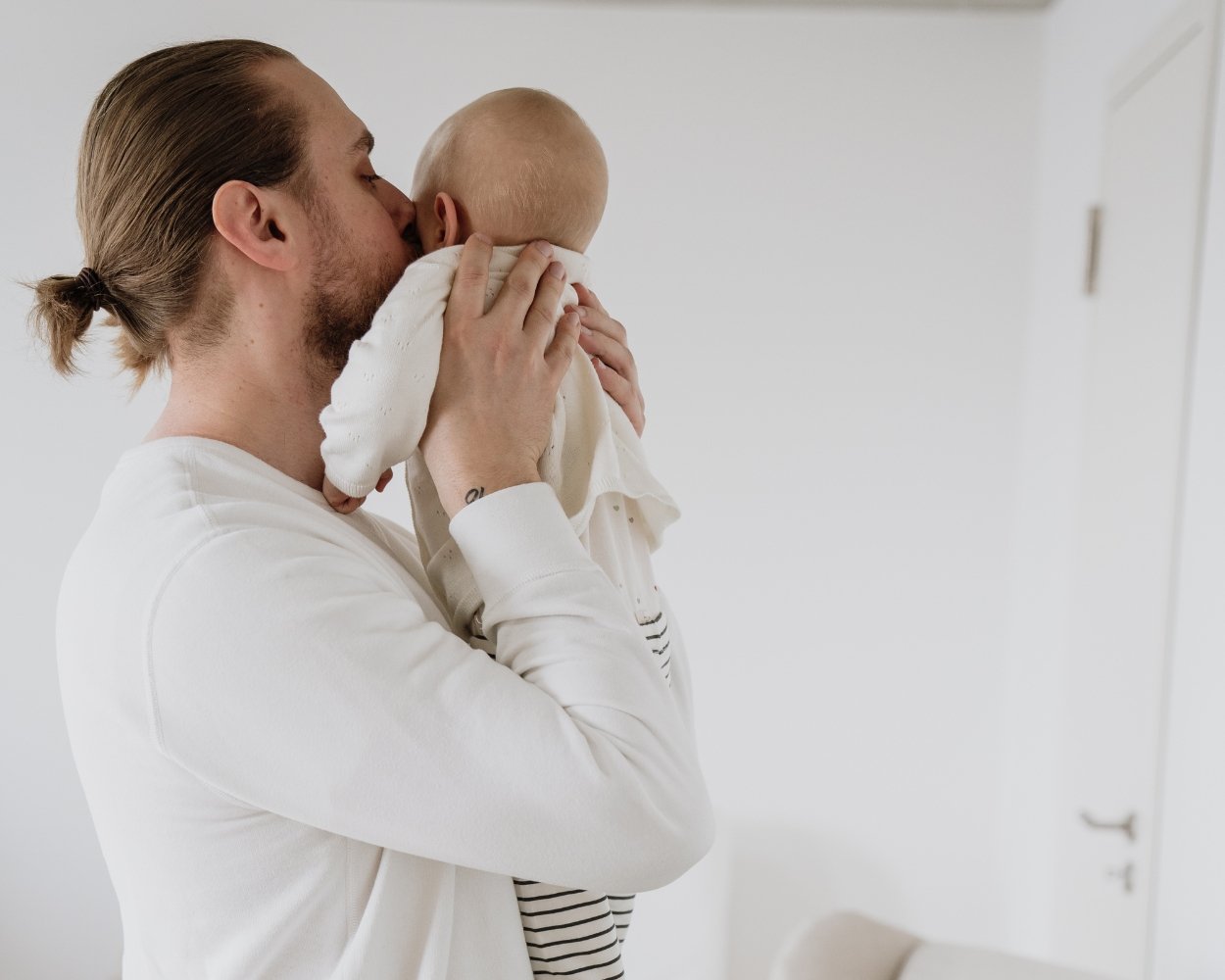
9. Safety in the baby room: what you should look out for
With a baby in the house comes many responsibilities and tasks. While it's important that your baby has a cosy and safe place to sleep, you also need to think about safety when setting up a baby's room. You can use a checklist to make sure your baby is well looked after and safe in their room.
Checklist for safety in the baby room
- Minimise the risk of injury: Start by choosing furniture with rounded edges to minimise the risk of injury.
- Secure sockets: Also remove any objects that your little one could reach and make sure that cables and plugs are protected by safety clips.
- Furniture stability: Make sure that the furniture is stable and cannot easily tip over - especially wardrobes and chests of drawers. Ideally, you should fix these to the wall.
- Curtain without risk: You also need to be careful when choosing window blinds. Avoid curtains or blinds with long ribbons or cords, as these can be a strangulation hazard.
- Secure toys and decorations: To avoid strangulation risks, you should also avoid hanging toys or other objects on the wall near the baby's bed. You should also avoid too many and too large pillows, blankets or cuddly toys in the cot.
- For emergencies: For additional safety, you can install smoke alarms and have an emergency plan ready for all family members. You should also check whether the home has a fire extinguisher and whether it is easily accessible. A first aid plan for babies is also useful.
- Check regularly: Check all furniture and appliances regularly. Make sure everything is stable, remove unsafe objects and test the smoke alarms. Then you are well equipped for a safe baby room!

